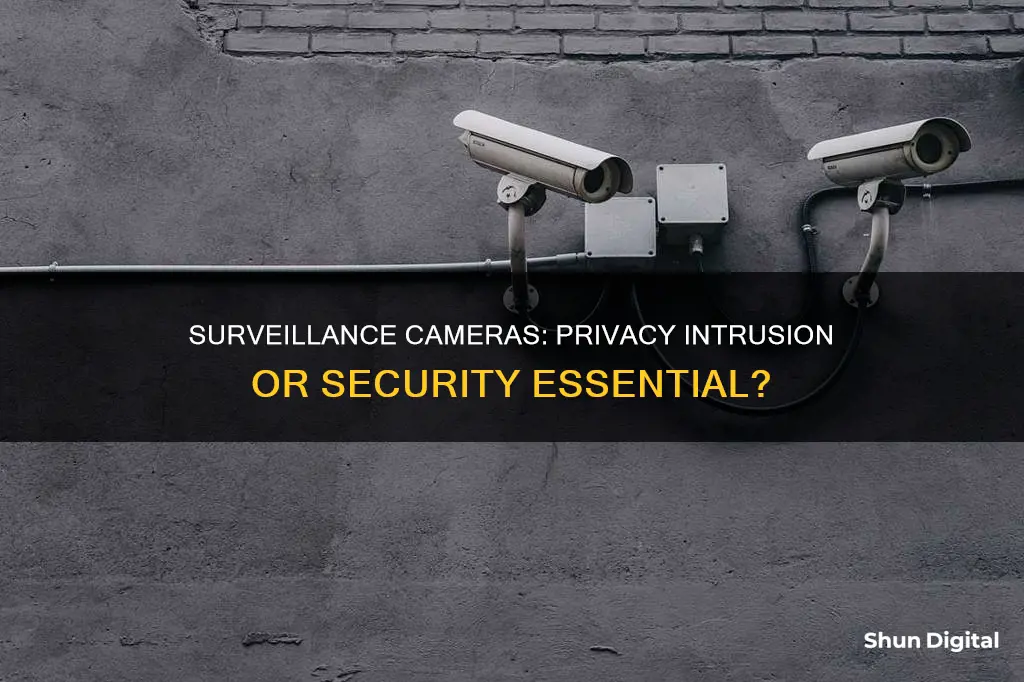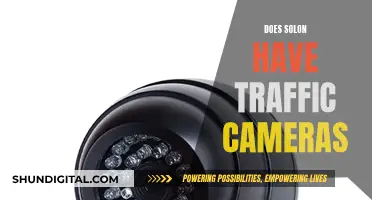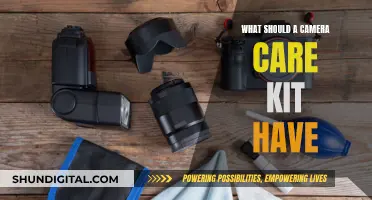
The use of surveillance cameras is a highly debated topic, with valid arguments on both sides. Proponents of surveillance cameras argue that they are an effective security solution, helping to protect properties and their occupants from theft, break-ins, and home invasions. On the other hand, critics argue that the widespread use of surveillance cameras, especially hidden ones, poses a significant threat to individuals' right to privacy. This is a complex issue, as the legality of surveillance cameras is influenced by various factors, including the location of the cameras, the extent to which they invade privacy, and the laws and consent of the state in which they are installed.
| Characteristics | Values |
|---|---|
| Surveillance Cameras | Not an invasion of privacy when used appropriately |
| Can be a threat to privacy when used inappropriately | |
| Should not be placed in private areas such as bedrooms or bathrooms | |
| Should not be hidden or placed without consent | |
| Should not record audio without consent | |
| Should not be used to discriminate or for voyeurism | |
| Should be subject to checks and balances to prevent abuse | |
| Should not be used to chill free expression in public spaces | |
| Should be used to protect security and prevent crime |
What You'll Learn

Surveillance cameras in public spaces
The use of surveillance cameras in public spaces is a highly debated topic, with valid arguments on both sides. On the one hand, these cameras can be seen as an invasion of privacy and a threat to civil liberties. However, on the other hand, they can also be viewed as a necessary tool for ensuring public safety and fighting crime.
Arguments Against Surveillance Cameras in Public Spaces:
Invasion of Privacy:
One of the main concerns with surveillance cameras in public spaces is the potential invasion of privacy. People generally expect a certain level of privacy, even in public areas. The presence of cameras can make individuals feel like they are constantly being watched and monitored, which can be uncomfortable and restrictive. This is especially true when cameras are placed in sensitive areas, such as outside residential buildings or in places where individuals may engage in personal activities.
Civil Liberties and Government Overreach:
The use of surveillance cameras by government entities has raised concerns about the potential for government overreach and abuse of power. Some argue that widespread surveillance allows the government to monitor and track citizens' movements and activities, which can be misused in the wrong hands. This can lead to a chilling effect on behaviour and a restriction of civil liberties, as people may feel hesitant to express themselves freely or assemble in certain areas.
Ineffectiveness and Misuse:
There is also debate about the effectiveness of surveillance cameras in actually preventing crimes. Some argue that these cameras are a less effective alternative to having more police officers on the ground and that they provide a false sense of security. Additionally, there is a risk of misuse or abuse of the footage obtained, such as for voyeuristic purposes or discriminatory targeting, as seen in the case of the New York City police helicopter incident.
Arguments in Favour of Surveillance Cameras in Public Spaces:
Public Safety and Crime Prevention:
The primary argument in favour of surveillance cameras in public spaces is that they enhance public safety and help deter and prevent crimes. The presence of cameras can discourage potential criminals from engaging in illegal activities, knowing that they are being recorded. Surveillance footage can also provide valuable evidence during police investigations, helping to identify and apprehend criminals.
Fighting Terrorism:
In the post-9/11 world, the threat of terrorism has become a significant concern for many countries. Surveillance cameras in public spaces are seen as a crucial tool for monitoring and detecting potential terrorist activities. The Boston Marathon bombing is often cited as an example of how surveillance cameras can help quickly identify and apprehend suspects.
Anonymity and Expectation of Privacy:
Proponents of surveillance cameras in public spaces argue that individuals in public do not have the same expectation of privacy as they would in private spaces. Being in a public area means that one is visible to other members of the public, and cameras can be seen as an extension of this. Additionally, the presence of cameras can provide a sense of anonymity, as individuals may feel more comfortable knowing that they can remain relatively anonymous in a crowd.
In conclusion, the debate surrounding surveillance cameras in public spaces is complex and multifaceted. While these cameras can provide benefits in terms of public safety and crime prevention, there are also valid concerns about privacy, civil liberties, and potential misuse. Striking a balance between these considerations is essential to ensure that the benefits of surveillance technology outweigh the risks and negative impacts on society.
Selfie Mode: An Unintentional Adventure
You may want to see also

Surveillance cameras in private spaces
The use of surveillance cameras in private spaces is a highly contested issue, with valid arguments on both sides of the debate. On the one hand, security cameras are the most popular security solution among homeowners, and when used appropriately, they are not considered an invasion of privacy. The primary purpose of these cameras is to protect a property and its occupants from theft, break-ins, and home invasions, and they are also useful for insurance claims.
However, the key to ensuring that these cameras do not breach privacy laws is to be mindful of the "reasonable expectation of privacy." This means that cameras should not be placed in areas where individuals have a reasonable expectation of privacy, such as bathrooms, bedrooms, changing rooms, or locker rooms. In the United States, each state has its own privacy laws and consent laws that govern the use of security cameras. For example, in Georgia, cameras must be in plain sight, while Alabama permits hidden cameras without prior consent.
The issue of consent is crucial, especially when it comes to audio recordings. Most states follow "one-party consent" rules, where only one person in a conversation needs to be aware of the recording, but some states, like California, Delaware, Florida, Illinois, and Maryland, require the consent of all parties.
When it comes to outdoor cameras, it is generally acceptable to have them outside your home, but they should not be pointed directly at a neighbor's window, as this violates their reasonable expectation of privacy.
While security cameras can provide peace of mind and help protect your property, it is essential to be mindful of the legal implications and respect the privacy of others.
Drive Mode Button: Understanding Camera's Power Feature
You may want to see also

Surveillance cameras in the home
Surveillance cameras are an increasingly popular security measure in the US, with many homeowners opting to install them to protect their property and its occupants from theft, break-ins, and home invasions. While some people argue that surveillance cameras are an invasion of privacy, others claim that they are not when used appropriately.
Privacy Concerns
The American Civil Liberties Union (ACLU) has raised concerns about the increasing use of video surveillance in public spaces, arguing that it could have a chilling effect on public life and lead to a loss of civil liberties. They point out that video surveillance has not been proven effective in reducing crime and that it is susceptible to abuse by law enforcement and other government agencies.
Privacy Laws and Consent
In the US, citizens are entitled to privacy, and various rules apply to the use of video and audio recordings on properties, business premises, and public spaces. While it is generally legal to install home security cameras and save the footage for security purposes, insurance claims, or as evidence in legal proceedings, there are limits to what can be recorded without violating privacy laws.
Guidelines for Responsible Use of Home Surveillance Cameras
To avoid invading someone's privacy, it is important to follow these guidelines:
- Do not place cameras in areas where there is a reasonable expectation of privacy, such as bathrooms or bedrooms.
- Do not record inside a neighbour's home without their consent.
- Do not use hidden cameras or cameras that are not in plain sight, unless permitted by state law.
- Obtain consent from all parties involved before recording audio.
Benefits of Surveillance Cameras in the Home
Surveillance cameras offer several benefits for homeowners, including:
- Deterring trespassers and potential criminals.
- Alerting homeowners to suspicious activity, even when they are not at home.
- Providing evidence in the event of a break-in or theft.
- Monitoring packages delivered to the home and helping to prevent porch piracy.
When used appropriately and within the boundaries of the law, surveillance cameras in the home can be a valuable tool for protecting one's property and personal safety without invading the privacy of others. However, it is important for homeowners to be aware of their legal obligations and the potential consequences of misusing surveillance technology.
Baltimore Traffic Camera Tickets: What You Need to Know
You may want to see also

Surveillance cameras and consent laws
Surveillance cameras are a common feature of modern life, with many people installing them in and outside their homes. While they are generally not considered an invasion of privacy, there are important nuances to consider, especially when it comes to consent laws.
Consent Laws
Consent laws govern the circumstances in which it is legal to record someone without their permission. In the US, there is a "one-party consent" law, which means that it is legal to record a conversation, either in person or remotely, as long as one party to that conversation consents to the recording. This typically includes the person doing the recording.
However, this law does not cover video-only surveillance, only applying when a conversation is involved. Nevertheless, as many security cameras also record audio, this is an important law to keep in mind.
There is also a "two-party consent" law, which requires everyone in a conversation to give consent to be recorded. At the time of writing, 11 states follow this rule for audio recordings.
The use of surveillance cameras must take consent laws into account. For example, if a security camera in a private residence records audio, the one-party consent rule usually applies, as the resident is aware that audio is being recorded.
Video-only surveillance is more complex. While there is no specific federal law prohibiting video surveillance in public, there are national consent and privacy laws that apply.
In the US, it is generally legal to install a residential security camera and record video. However, citizens are guaranteed a "reasonable expectation of privacy", which also extends to video recording. This means that certain private places, such as bathrooms, bedrooms, and changing rooms, are off-limits for recording.
The laws around video surveillance vary at the state level. For example, in California, it is illegal to record any communication considered confidential, regardless of consent. In Alabama, hidden cameras are permitted without prior consent, while Georgia requires cameras to be in plain sight.
The placement of cameras is also important. Cameras should not be positioned to record the interiors of neighbouring properties, especially private areas.
In the case of businesses, some states, like Delaware and Connecticut, require businesses to notify employees and customers if there are cameras that may breach expectations of privacy, such as in bathrooms.
To summarise, while surveillance cameras are generally not considered an invasion of privacy, it is important to be aware of and comply with consent laws and privacy expectations, especially when installing cameras in private spaces or recording audio.
Charging the Eufy Solar Camera: A Quick Guide
You may want to see also

Surveillance cameras and privacy laws
The use of surveillance cameras is a highly debated topic, with some arguing that they are an invasion of privacy, while others view them as a necessary security measure. While there are currently no federal laws in the US addressing the use of surveillance cameras, various state laws and privacy laws govern their placement and usage. Here is an overview of the complex relationship between surveillance cameras and privacy laws:
Public vs Private Spaces
Surveillance cameras in public spaces are generally considered legal, as individuals typically do not have a reasonable expectation of privacy in these areas. However, it is important to note that this expectation can vary depending on the specific state and location. For example, recording in a public changing room or hotel room may be deemed an invasion of privacy.
Consent Laws
Consent laws play a crucial role in the legality of surveillance cameras. In most states, the 'one-party consent' rule applies, meaning that as long as one person in a conversation is aware of the recording (including the person recording), it is legal. However, a minority of states, including California, Delaware, Florida, Illinois, and Maryland, follow the 'two-party consent' rule, requiring all parties in the conversation to give consent for recording.
Placement of Cameras
The placement of surveillance cameras is a critical factor in ensuring privacy. It is generally recommended to keep cameras away from private areas such as bedrooms, bathrooms, and changing rooms, both inside homes and in public spaces. Cameras should also not be directed towards a neighbour's home, intentionally recording their property or the interior of their house.
New Surveillance Technology
The rapid evolution of technology has introduced new forms of surveillance, such as aerial drones and police body cameras, which have sparked further debates about privacy. While these technologies can enhance security, they also raise concerns about the bounds of privacy and the potential for abuse or misuse.
Privacy Concerns and Protections
The increasing presence of public cameras can significantly impact the character of public spaces, making individuals more self-conscious and cautious. To address these concerns, measures such as establishing clear limits and controls on camera use, obtaining consent, and ensuring proper positioning of cameras are essential.
In conclusion, while surveillance cameras can be a valuable security tool, it is crucial to strike a balance between security and the protection of individuals' privacy rights. Adhering to privacy laws, obtaining necessary consent, and using cameras appropriately are key aspects of ensuring that surveillance measures do not infringe upon personal privacy.
Loading Batteries into Your DXG 552 Camera: A Step-by-Step Guide
You may want to see also
Frequently asked questions
Surveillance cameras are not an invasion of privacy when used appropriately. However, they can become an invasion of privacy when they are placed in areas where an expectation of privacy exists, such as private homes, bedrooms, bathrooms, changing rooms, etc.
Surveillance cameras can help protect property and occupants from theft, break-ins, and home invasions. They are also useful for insurance claims and can provide valuable footage for law enforcement investigations.
Yes, the legality of surveillance cameras depends on federal, state, and local laws. Generally, it is legal to record video in public spaces, but not in private spaces without the consent of the individuals being recorded. Audio recording laws vary, with some states requiring the consent of all parties involved in a conversation.
Misusing surveillance cameras can result in legal consequences, including lawsuits and prosecution for violation of privacy laws. It can also damage the reputation of a company or organization and create morale problems among employees.
To protect your privacy, you can express your concerns to the owner of the camera and request that the camera be repositioned or removed. In some cases, legal action may be necessary, but it should only be considered as a last resort. It is also important to be aware of the laws and regulations regarding surveillance cameras in your area.







